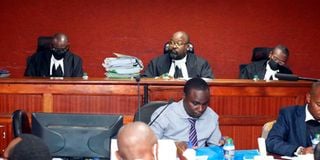Breaking News: At least 10 feared to have drowned in Makueni river
Court declines to bar 241 aspirants facing integrity probes

From left: High Court judges Chacha Mwita, David Majanja and Mugure Thande during hearing of several petitions on June 9, 2022.
The High Court has declined a request by the anti-corruption watchdog and activists to have 241 aspirants facing integrity probes barred from contesting the forthcoming General Election.
The Ethics and Anti-Corruption Commission (EACC), the activists and the Director of Public Prosecutions united against the electoral agency, which was cast as the weak link in efforts to bar tainted individuals from the ballot.
They wanted the court to declare that aspirants with active criminal and corruption cases, impeached public officials and those with questionable integrity should not be allowed to contest elective positions.
Among those targeted in the lawsuit was former Nairobi governor Mike Sonko, former Kiambu County government Sports executive Karungo Thang’wa and Nakuru Town West MP Samuel Arama.
Others were aspirants for governor, senator, MP and ward rep seats that the EACC recently flagged over allegations of corruption and economic crimes and wanted barred from the elections.
But the court said it could not grant the requests, saying the petitioners had not exhausted existing alternative dispute resolution remedies provided for in the law.
The three-judge bench composed of justices David Majanja, Chacha Mwita and Mugure Thande also said the nine petitions were general in nature and raised issues without providing concrete facts.
“We hold the view that the petitions are general in nature, raise issues without reference to concrete facts, do not allege any wrongdoing against a specific person and do not have specific respondents against whom such relief may be granted,” said the court.
The suit was a consolidation of nine petitions that sought the court's guidance on the interpretation and application of Chapter Six of the Constitution in relation to aspirants seeking elective positions.
“The petitions only beseech the court to pronounce itself on abstract and clearly academic questions. We reject this entreaty,” the court added.
The justices also ruled that the proper forum to raise the objection against the clearance of the tainted aspirants was the Independent Electoral and Boundaries Commission (IEBC).
In the 34-page judgment, the court affirmed the powers of the IEBC to allow or disallow the nomination of aspirants and to resolve pre-election disputes.
Pre-election disputes
The court stated that the matters raised amounted to pre-election disputes such as those regarding candidates’ suitability and eligibility for nomination.
Such issues, the court said, must be resolved by the IEBC in the first instance. The judges said the High Court’s jurisdiction is only triggered once the IEBC makes a decision on the issue.
The court found that the petitioners had not exhausted existing alternative remedies created under Article 88(4)(e) of the Constitution and Section 74 of the Elections Act.
“The argument is based on the fact that the individuals whose conduct is impugned have put their names forward for nomination by the IEBC, which has a mechanism through its DRC (Dispute Resolution Committee) for resolving any disputes arising from nominations,” the court said.
The judges added that the Supreme Court had in 2018 said that all pre-election disputes, including those relating to or arising from nominations, should be taken for resolution to the IEBC or the Political Parties Disputes Tribunal, as the case may be, in the first instance.
“The Supreme Court emphasised that the issue of the suitability of a candidate ought to be brought before the IEBC in the first instance and pursued from there,” said the court.
In regard to petitions lodged against Mr Sonko, Mr Thang’wa and Mr Arama, the judges said they were presented to court prematurely.
“Even then, parties admitted that they had submitted themselves to the jurisdiction of the IEBC’s Dispute Resolution Committee (DRC) under Article 88(4)(e) as read with section 74 of the Elections Act. Since the DRC process has been invoked, it must be allowed to run its course. The jurisdiction of this court should not be invoked until that process is exhausted,” said the judges.
They ruled that since the petitions relating to the nomination process concerning Mr Sonko, Mr Thang’wa and Mr Arama were premature, the court could not exercise its authority to deal with the cases.
The petitioners wanted Mr Sonko and Mr Thang’wa barred because they were impeached and removed from office over gross misconduct, while Mr Arama’s nomination was fought because of a pending corruption case.
The EACC had told the court that in discharging its mandate, it forwards an integrity verification report to guide the IEBC in nominations of political aspirants and ensure that nominated candidates comply with Chapter Six of the Constitution.
The EACC stated that the IEBC is obliged by the Constitution –Article 259(11) and Section 4(3) and (4) Leadership and Integrity Act – to act in accordance with the integrity verification report and decline to clear candidates who have not met the constitutional and statutory integrity threshold.
But the IEBC responded that it is an independent commission and is not subject to the direction or control of any person or authority.
On matters of integrity and leadership under Chapter Six, the IEBC explains that in exercising its role in the nomination process it acts in accordance with the Constitution, the IEBC Act, the Elections Act, the Elections (General) Regulations and all other applicable laws.





